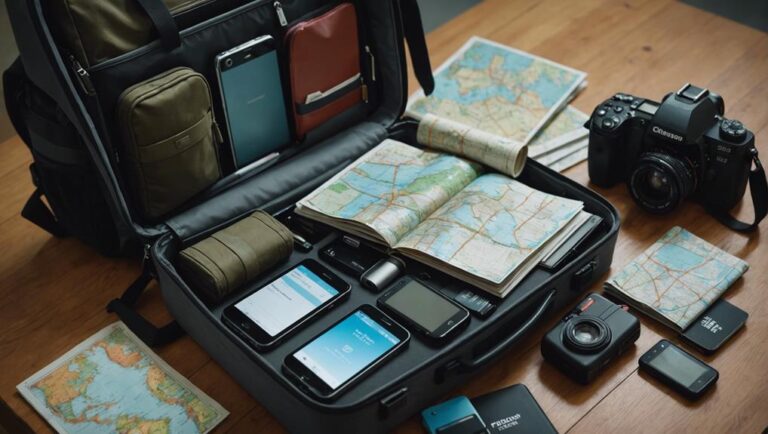Managing Finances as a Digital Nomad
To manage your finances as a digital nomad effectively, focus on budgeting, tracking expenses, handling taxes, setting goals, boosting income streams, and planning for the future. Prioritize budgeting on the go, utilize apps for expense tracking, understand tax rules, set clear financial goals, explore various income sources, and plan for retirement. By taking these steps, you can guarantee financial stability while embracing a flexible lifestyle. Mastering these strategies will help you thrive financially as a digital nomad.
Budgeting on the Go
To effectively manage your finances while living as a digital nomad, it's important to master the art of budgeting on the go. One vital aspect of this is prioritizing travel savings. By setting aside a portion of your income specifically for travel expenses, you guarantee that you have the financial means to continue your nomadic lifestyle without constantly worrying about funds.
Expense tracking is another key component of successful budgeting as a digital nomad. Utilize apps or spreadsheets to monitor your spending closely. Make sure to categorize your expenses, such as accommodation, transportation, food, and activities.
This detailed tracking will help you identify areas where you can cut costs and optimize your budget.
Tracking Expenses Efficiently
Effectively tracking your expenses is an essential aspect of maintaining financial stability as a digital nomad. To do this efficiently, start by categorizing your expenses into groups such as accommodation, transportation, meals, and entertainment.
Utilize budgeting apps or spreadsheets to easily input and monitor your spending. Keep all your receipts organized either digitally or in a physical folder to help with tracking and potential reimbursement.
When dealing with international transactions, consider using financial tools that offer currency conversion at competitive rates. This can help you avoid unnecessary fees and ensure accurate tracking of your expenses in your home currency. Additionally, be mindful of any foreign transaction fees that your bank may charge.
Regularly review your expenses to identify any patterns or areas where you can cut back. By staying organized and proactive with expense tracking, you can better manage your finances and make sure that you stay within your budget while living the digital nomad lifestyle.
Navigating Tax Obligations
When living as a digital nomad, understanding tax residency rules and potential remote work deductions is essential for managing your finances effectively.
Knowing where you're considered a tax resident and how it impacts your obligations can help you plan ahead and avoid unexpected liabilities.
Additionally, exploring deductions for expenses related to your remote work can maximize your tax savings and keep your financial situation in order.
Tax Residency Rules
Understanding the tax residency rules is essential for managing your tax obligations as a digital nomad. Tax jurisdiction and residency requirements play an important role in determining where and how you pay taxes.
As a digital nomad, you may be subject to taxation in different countries based on the amount of time spent in each location and other factors.
Tax jurisdiction refers to the authority a country has to impose taxes on individuals or entities. Residency requirements vary by country but often involve factors like the number of days spent in the country, the intention to establish a permanent home, or the center of vital interests.
To ensure compliance with tax laws, it's important to keep detailed records of your travel dates, work locations, and any tax treaties that may apply.
Seeking advice from a tax professional who understands the complexities of international taxation can help you navigate these rules and minimize your tax liability while staying compliant.
Remote Work Deductions
Managing your tax obligations as a digital nomad includes understanding how to leverage remote work deductions effectively to optimize your financial situation. One of the notable remote work benefits is the potential for tax deductible expenses.
As a digital nomad, you may be able to deduct expenses directly related to your remote work, such as equipment, software, internet costs, and even a portion of your rent or utilities if you have a dedicated home office. Keep meticulous records of these expenses to make sure you can substantiate them if needed.
It's essential to stay informed about the specific tax regulations in the countries you operate from as a digital nomad, as rules can vary significantly. Consider consulting with a tax professional who's knowledgeable about international tax laws to maximize your deductions while staying compliant.
Setting Financial Goals
To navigate your financial journey successfully as a digital nomad, it's important to establish clear and achievable financial goals. Setting financial goals will provide you with a roadmap for managing your finances effectively while living a location-independent lifestyle.
Start by outlining your savings strategies, which may include setting aside a portion of your income each month for emergencies or future investments. Consider exploring different investment options that align with your risk tolerance and financial objectives to help your money grow over time.
Financial planning is essential for digital nomads, especially when it comes to retirement goals. Determine how much you need to save for retirement based on your desired lifestyle and projected expenses. Create a savings plan that accounts for regular contributions to retirement accounts or other long-term investment vehicles.
Maximizing Income Streams
To thrive as a digital nomad, you must focus on diversifying your revenue sources and leveraging your digital skills to maximize your income streams.
By exploring various avenues such as freelancing, online courses, affiliate marketing, and passive income streams, you can create a robust financial foundation.
Diversifying Revenue Sources
Diversifying your revenue sources is essential for maximizing your income streams as a digital nomad. By incorporating passive income streams alongside your freelance gigs, you can create a more stable financial foundation.
Passive income, such as royalties from digital products, investments, or affiliate marketing, can provide you with earnings that aren't solely dependent on the hours you put in. This allows you to have a more consistent flow of income even during times when your freelance work may be slow.
In addition to passive income, consider diversifying your freelance gigs across different platforms or industries. This not only helps spread your risk but also opens up opportunities to tap into various client bases and potentially higher-paying projects.
For example, if you primarily focus on graphic design, you could explore freelance opportunities in web development or content writing to broaden your revenue streams.
Leveraging Digital Skills
Exploit your digital skills to maximize income streams by capitalizing on the demand for your expertise in the online marketplace. As a digital nomad, you have a unique advantage in leveraging your skills to secure freelance opportunities and diversify your revenue sources.
Online marketplaces are abundant with opportunities for individuals with digital skills, whether it's graphic design, content writing, web development, or digital marketing.
To make the most of your digital skills, start by creating profiles on popular freelancing platforms such as Upwork, Freelancer, or Fiverr. These platforms connect you with clients worldwide who are seeking your specific expertise.
Additionally, consider reaching out to potential clients directly through social media or professional networking sites to expand your freelance opportunities.
Planning for the Future
When considering planning for the future as a digital nomad, it's important to prioritize long-term financial stability and security. Retirement planning and investment strategies play a vital role in securing your financial future while leading a nomadic lifestyle.
As a digital nomad, you have the flexibility to choose retirement plans that cater to your unique circumstances. Traditional options such as Individual Retirement Accounts (IRAs) or 401(k)s may still be viable, or you could explore alternative options like a Simplified Employee Pension (SEP) IRA, which allows higher contribution limits for self-employed individuals.
In addition to retirement planning, consider diversifying your investment portfolio to mitigate risks and potentially increase returns. Research different investment opportunities that align with your risk tolerance and long-term financial goals. Real estate, stocks, bonds, and mutual funds are all viable options that can provide a mix of stability and growth potential.
Conclusion
To sum up, managing finances as a digital nomad requires:
- Budgeting on the go
- Tracking expenses efficiently
- Addressing tax obligations
- Setting financial goals
- Maximizing income streams
- Planning for the future
By staying organized and proactive in your approach to finances, you can guarantee financial stability and success while living a location-independent lifestyle.
Stay focused on your goals, monitor your spending, and continuously evaluate your financial situation to thrive as a digital nomad.







